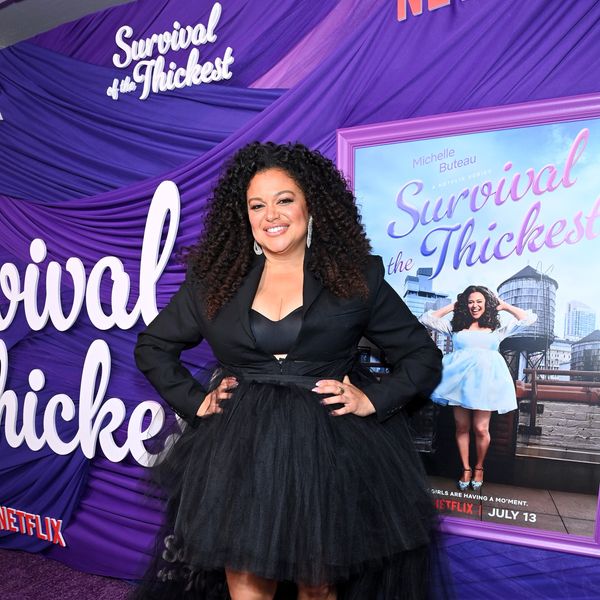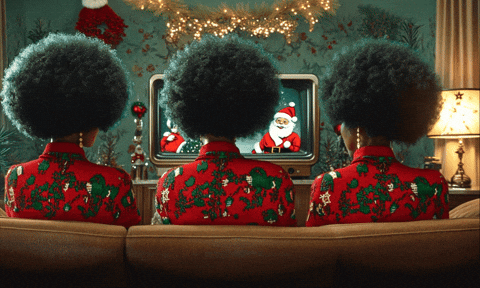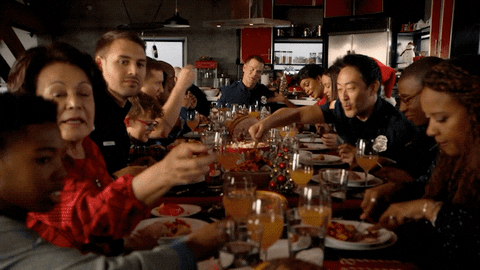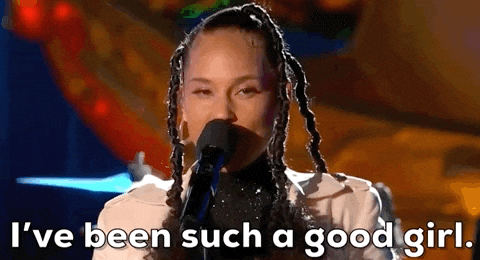5 Lessons Michelle Buteau’s 'Survival Of The Thickest' Netflix Series Taught Me

Michelle Buteau’s comedy series Survival of Thickest recently premiered on Netflix. And as a plus-size woman in her thirties, seeing a plus-size character who wasn’t the sidekick was extremely refreshing. Yes, the Plus community has had a few main characters (i.e., Miss Piggy – fat and fabulous). But at what cost? Like other plus-size characters, Miss Piggy was constantly ridiculed for her size.
Historically, plus-size female characters were pigeonholed into comedic relief roles or underwent a transformation to be deemed “attractive.” Such portrayals perpetuate the damaging message that one's value or beauty is tied to their body size. And because I didn’t have the representation, I wanted on-screen then, I am so happy to see the shift in how plus-size characters are portrayed now. Representation matters immensely. It shapes perceptions, builds confidence, and fosters acceptance. Everyone deserves to see diverse bodies depicted as confident, beautiful, and worthy of love.
Buteau refers to her series as a “love letter to fatty baddies” during an interview with NPR, and I couldn’t agree more. In addition to being an attention-grabbing and funny series, Buteau was meticulous in creating the on-screen lead – Mavis Beaumont. She was fun-loving, empowering, and raw. Mavis stood in who she was, not just as a woman but as a plus-size baddie. She never settled, which once again…thank you! This series taught me five lessons – some new and some I just needed a friendly reminder of.
Loving your plus-size body isn’t WEIRD (or even wrong)
This was one lesson I always knew, but seeing a TV series reaffirm it makes it that much more important. Something about seeing fat positivity seems to irk some people’s spirits. It doesn’t matter if you’re a size ten or size twenty-two; you deserve to love the skin you are in. You deserve to feel comfortable, loved, and seen. And no one has the right to take offense to you loving every inch and roll of your body. Mavis did a fantastic job showcasing this lesson throughout the season.
But unfortunately, there are still so many who disagree. For instance, plus-size beauty and fashion influencer Stella Williams is often criticized for her confidence in wearing various clothing – side cut-out swimsuits, crop tops, etc. She is constantly criticized for not “minimizing her stomach” no matter how cute the outfit is, but why should she? Why is it wrong that a plus-size woman loves her body and has no issues hiding it? Williams continuously breaks the barriers of unrealistic beauty norms and refuses to be shut out.
Plus-size characters are MORE than a joke
Survival of the Thickest proved that writers can create a character without making that individual a stereotype. A fat character on screen doesn’t have to be glutinous, sloppy, or joking about their bodies. And let’s be honest; fat jokes are unoriginal. Fat jokes have plagued TV shows and films for years. One example is the popular cult classic Next Friday, where Day-Day (Mike Epps) used food to influence Baby D (played by rapper The Lady of Rage) to stop chasing after him. Those types of jokes imply that plus-size people have an unhealthy relationship with food, an obsession.
Plus-size people can be a MAIN CHARACTER
This lesson applies to real-life and on-screen. Your size doesn’t mean you can’t be the main character ever. Nowadays, I see plus-size people who own who they are, but this lesson is for those who never saw a plus-size main character or didn’t feel they could be the main character in their own lives.
I grew up in an era where plus-size representation was SCARCE. Honestly non-existent. Unless it was coming from close to home, you might’ve not experienced being told you were beautiful without it was a backhanded comment – “Pretty for a big girl” or “You would be prettier if you lost weight.” Therefore, you had to have tough skin on the playground and in the world. And it would be the same sentiment in movies and books. But do not dim your light because of how others believe you should be or look.
Be Authentically YOU
One thing I respected about Mavis was that she was authentically herself. People change to conform to spaces that weren’t meant for them. And I’ve always said I’m too big to be placed in a box, personality included. Plus, life is too short not to be who you are and meant to be. Every space – friends/circles, environments, etc. – aren’t meant for you, and that’s OK.
A great example: Survival of the Thickest co-creator, executive producer and star Michelle Buteau. She has consistently reinforced that one's power comes from being authentic to oneself. By sharing her experiences as a plus-size woman in the entertainment industry, Buteau demonstrates the importance of being genuine in a world that often promotes idealized images of women. This lesson teaches us to empower ourselves and inspire others by honoring and showcasing our authentic selves.
Plus-size bodies ARE desirable
Like number one, this was a lesson I learned early, but once again, Mavis reaffirmed it throughout the season. I enjoyed that Mavis found love without feeling the need to change. One movie you witness this in is the 2006 rom-com Phat Girlz. The main character Jazmin, played by Mo’Nique, couldn’t believe Dr. Tunde was initially interested in her or was faithful, so much so that Jazmin questioned him at one point for not trying to sleep with her. I remember being frustrated that the main character only felt desirable through a level of sexual attraction.
Another time we see this is in the early 2000s series Degrassi. I wanted so much more for Terri’s character. She was plus-size and one of the prettiest girls on the show, but her character was made to be insecure. And I understand this was a teen series; therefore, they were dealing with underage drinking, insecurities, and love, but she deserved a more fleshed-out story.
Let’s make things inbox official! Sign up for the xoNecole newsletter for daily love, wellness, career, and exclusive content delivered straight to your inbox.
Feature image by Roy Rochlin/Getty Images for Netflix
This Is How To Keep 'Holiday Season Stress' From Infecting Your Relationship
Hmph. Maybe it’s just me, but it seems like there is something really weird happening in the fall season air (because winter doesn’t officially begin until December 21) that cuddle season is in full swing while break-up season is as well. In fact, did you know that break-ups are so popular during the holiday season that December 11 is deemed Break-Up Day?
The reasons why relationships shift around this time vary; however, I did both roll my eyes and chuckle when I read that a very popular one is because it’s an easy way to get out of getting one’s significant other a Christmas present. SMDH.
Anyway, I personally think that the less shallow folks out here may contemplate calling things “quits” or they at least distance themselves a bit from their partner (and what I’m referring to is serious relationships) due to all of the stress and strain that oftentimes comes with the holidays whether it be financial, familial, due to their tight schedules or something else.
Listen, I would hate for you and your man to miss the fun and happiness of experiencing this time of year, all because you are so overwhelmed or irritated that you can’t really enjoy it. That’s why I have a few practical tips for how to avoid allowing the typical holiday season stress from INFECTING your relationship.
Manage Your Expectations
 Giphy
GiphyUnmanaged expectations. If there is a main reason why the holiday season tends to be so stress-filled for so many people, I’d bet good money that this is the cause. And when you’re in a long-term relationship, expectations can manifest themselves in all sorts of cryptic and/or unexpected ways. You might have relatives who assume that you are going to be with them for Thanksgiving or Christmas when you have other plans in mind. You might be thinking that you are going to spend one amount for presents while your man is thinking something totally different. When it comes to scheduling, your signals may be crossed.
And you know what? To all of these scenarios, this is where clear and consistent communication come in. Don’t assume anything. Don’t dictate anything either. From now until New Year’s, mutually decide to check in once a week, just to make sure that you are both on the same page as it relates to the holidays and what you both are thinking will come along with it. The less blindsided you both feel, the less stressed out you will be. Trust me on this.
Set (and Keep) a Budget
 Giphy
GiphyOkay, so I read that last year, 36 percent of Americans incurred some type of holiday-related debt. Hmph. Last year, there was still some sense of normalcy in this country, chile, so I can only imagine what finances are gonna look like over the next several weeks. That said, since I don’t know a lot of people who don’t find being broke stressful, make sure that you and your bae set a budget and then stick to it this year — no ifs, ands or buts.
Because really, y’all — it doesn’t make sense to deplete savings and/or max out credit cards for a few days of giggles only to be damn near losing your mind because you don’t know how to make ends meet come Dr. Martin Luther King, Jr. Day.
And by the way, this tip doesn’t just speak to things like food and gifts; I also mean travel. If it doesn’t make a ton of sense (or cents) to be all over the place this year — DON’T BE.
Keep Matthew 5:37 at the Forefront
 Giphy
GiphyIf off the top of your head, you don’t know what Matthew 5:37 says, no worries, here ya go: “But let your ‘Yes’ be ‘Yes,’ and your ‘No,’ ‘No.’ For whatever is more than these is from the evil one.” That verse right there? Oh, it’s a boundaries lifesaver! I say that because do you see “maybe” or “I’ll think about it” in there? Nope. LOL. It says that you should tell people “yes” or “no” and leave it at that — and that complements Anne Lamott’s quote, “’No’ is a complete sentence” impeccably well. Yeah, you’ve got to remember that anything beyond a yes or no to a request is privileged information; you don’t owe anyone details or an explanation.
Besides, if you are really honest with yourself, when someone asks you something and you give a “Umm, let me think about it” kind of reply, more times than not, you already know what your answer is going to be — so why not let you both off of the hook? Give your response. Commit to that. And let everyone (including yourself) get on with their lives and schedules.
I promise you that when it comes to those holiday parties, you are pissing more folks off by not RSVP’ing or doing so and not showing up than just saying, “Thank you but not this year” off the rip.
Remember That Your Personal Space Is Privilege Not a Right
 Giphy
GiphyA friend of mine recently bought a new house and invited me over to come see it. He’s a single man with no children, so as I was taking in all of the space that he had, especially as I walked through his finished basement, I joked about relatives coming to live with him. “Hell no” and “absolutely not” were pretty much his immediate responses as he went on to say that some folks even had the nerve to be offended when he told them that he had no intentions on taking DNA in.
Ain’t it wild how people think that your stuff is their right? And yes, that brings me to my next point. Your home is your sanctuary space. If you want to host folks this year — cool. If not, ALSO COOL. Please don’t let folks (family included) guilt you into how they want you to act or even into what they would do if the shoe was on the other foot. You are not them — and as one of my favorite quotes states, “If two people were exactly alike, one of them would be unnecessary.” (A man by the name Larry Dixon said that.)
Hell, my friends? They know that I am good for sending them random things that they need or even want all throughout the year. Coming over to hang out at my pace, though. Uh-uh. Chalk it up to being a card-carrying member of the ambivert club yet I like keeping my living space personal — and I sleep like a baby, each and every night, for feeling that way.
Always remember that your space, your time, your resources, your energy and shoot, yourself period (including your relationship), are all things that are your own. You get to choose how, when and why you want to share them. The holiday season is certainly no exception.
Cultivate Some “You Two Only” Traditions
 Giphy
GiphyIt’s not uncommon for some couples to hit me up after the holiday season to “detox.” Sometimes it’s due to the financial drama (and sometimes trauma) that they experienced. Sometimes it’s because they allowed their relatives (especially in-laws) to get more into their personal business than they should’ve. More than anything, though, it tends to be because they didn’t get enough quality time together and so ended up feeling “disconnected.”
Please don’t let that happen. Listen, I’m not even a holidays kind of woman and yet, I will absolutely sit myself down with some hot chocolate and chocolate chip cookies to enjoy a Hallmark holiday film or two. Aside from the fact that most of them are lighthearted and sweet, I also like that they usually focus on couples loving on each other amidst all of the holiday beauty and ambiance — which is something that all couples should set aside some time to do.
Maybe it’s a vacation. Maybe it’s a staycation. Or maybe it’s my personal favorite, A SEXCATION. Whether it’s for a few days, the weekend or even overnight — don’t you let the holidays go by without setting aside time for you and your man to celebrate one another. Don’t you dare (check out “Are You Ready To Have Some Very Merry 'Christmas Sex'?”).
GET. SOME. REST.
 Giphy
GiphyI once read that 8 out of 10 people get stressed out over the holidays and 3 out of 10 lose sleep during to it — and when you’re stress-filled and sleep-deprived, that can absolutely lead to hypersensitivity, making mountains out of molehills and even not being in the mood for sex.
Your relationship can’t afford to go through any of this, so definitely make sure to prioritize rest. I don’t care how unrealistic it might seem during this time, sleep should never be seen as a luxury; it will always and forever be a great necessity.
That said, try to get no less than six hours of shut-eye in (check out “6 Fascinating Ways Sex And Sleep Definitely Go Hand In Hand”) and even ask your bae to take a nap with you sometimes (check out “Wanna Have Some Next-Level Sex? Take A Nap, Sis.”). Not only will sleep help to restore your mind, body and spirit but, when it’s with your partner, it’s an act of intimacy that can make you both feel super connected, even in the midst of what might feel like chaos.
___
Holiday season stress is real. Still, never give it the permission or power to throw your relationship off. Put you and your man first and let the holidays be what they are gonna be, chile.
Let’s make things inbox official! Sign up for the xoNecole newsletter for love, wellness, career, and exclusive content delivered straight to your inbox.
Featured image by Shutterstock
Whew. Did you know that somewhere around 122 million Americans travel during the holiday season? Listen, I went to see my godbabies this past September and got caught up in a crazy ass traffic jam at BNA (the Nashville airport) that damn near has me considering air travel ever again — especially during this time of the year.
Besides, it’s not like it’s a written rule that you have to travel over the holidays. In fact, if you want to play it chill this year, why not enjoy a staycation instead? Although it might seem like it’s a “poor man’s compromise,” as you’re about to see, it actually…isn’t.
1. Go All Out with the Christmas Décor
 Giphy
GiphyThere is someone I know who is so obsessed with Christmas, she’s damn near annoying-borderline-terrifying. I’m. Not. Kidding. Yet hey, if you’re going to do a holiday-themed staycation (emphasis on “holiday-themed”), that’s kind of how you’ve got to be. Some décor ideas include:
- A fresh Christmas tree (is the most ideal) that is ultimately decorated
- Wreaths on outside and inside doors
- Garland (with twinkle lights) in predictable and unpredictable places
- Poinsettias
- Mistletoes
- Snow globes
- A stocking (with some of your favorite things in it)
- Fake snow
- Stars
- Angels
- Candy canes
- A BLACK Santa (LOL)
I mean, since you are going to be spending a lot of time at home, it can feel like a mini-winter wonderland if you are intentional about doing more decorating to your living space than you ever have before!
2. Buy a Couple of Christmas-Themed PJs
 Giphy
GiphyWhile I was doing some research on a totally different topic, I happened upon an article that talked about the psychology behind why we should be intentional about what we wear to bed. When you stop to think about the fact that (hopefully) you are sleeping somewhere between 6-8 hours every night, it would make sense that things like the color and fabric of your sleepwear would have a real impact on you — even subconsciously.
Well, when it comes to Christmas décor, specifically, not only does it take you back to nostalgic memories, it can also boost your moods. So, aside from being on-10 with your Christmas décor, also invest in some Christmas-themed PJs. Since you’re going to be doing a lot of lounging around (RIGHT?), do it in something that makes you think about all of your favorite things about this time of year.
3. Cop Some Christmas-Scented Candles
 Giphy
GiphyThere really is no telling how many articles that I’ve written where I am singing the praises of scented soy candles. Candles are soothing, comforting and a very easy way to reduce stress. Also, since it gets darker quicker and for a longer period of time around this time of the year, candles provide a relaxing vibe to your home. Since it is Christmastime, go with scents that are reminiscent of the season:
- Cinnamon
- Vanilla
- Cranberry
- Apple
- Pine
- Frankincense and Myrrh
- Peppermint
- Cashmere
- Ginger(bread)
- Orange
- Sugar Cookies
- Sandalwood
- Cloves
- Cedarwood
- (Hot) Chocolate
Personally, one of my favorite candle companies is Goose Creek. Their signature collections will have your entire house smelling like a high-end bakery. No exaggeration.
4. Play Some Winter-Themed ASMR Sounds
 Giphy
GiphyI’m from Nebraska and my mother was a New Yorker. So, if there is one thing that I like, it’s seasons and that includes snow during wintertime. Unfortunately, Nashville is cray-cray when it comes to that. If, where you live, the weather is all over the place too (which is why I think it’s insane that some people still give pushback to global warming) and you would like for it to at least seem like you are in your own winter wonderland — invest in some fake snow to strategically place around your home.
Oh, and don’t forget to turn on some winter-themed ASMR sounds too. YouTube has videos that run for hours on end that feature blizzards and howling winds that really can make you feel like you are in the midst of an ice storm.
5. Host a Holiday Movie Marathon
 Giphy
GiphyOne thing to remember about a staycation is it doesn’t mean that you have to be alone or that the only people who can participate are the ones who live with you. Since a staycation is simply about staying close to home instead of traveling afar — absolutely consider having some of your favorite people over for a holiday-themed movie marathon. Shoot, Black America Web even did you a solid by publishing “25 Best Black Christmas Movies Of All Time;” plus, Tubi has a Black holiday hits section of indie films too.
Oh, and make sure to get creative with the Christmas-themed snacks. Some ideas? Some Kentucky-fried turkey tenders with cranberry hot sauce (recipe here), some Holiday Hot Spinach Dip (recipe here), some Grinch Kabobs (recipe here), some roasted pecans (recipe here) and some Pomegranate Guacamole (recipe here).
6. Spend a Night (or Two) at a Hotel or Vacation House
 Giphy
GiphyJust like you don’t have to be alone during a staycation, you also don’t have to be cooped up in your house the entire time. Get a change of scenery in your own city by spending the night in a hotel that you’ve always wanted to try out or renting a vacation house for you and some of your folks to hang out in during the time between Christmas and New Year’s Day. I have a “love little sister” who does this randomly when she needs a break from her work as a therapist. She says that it’s damn near like taking a trip (and she has PLENTY of passport stamps; trust me).
7. Have Brunch or Dinner at a Christmas-Themed Restaurant
 Giphy
GiphyIf nothing puts a bigger smile on your face than the thought of DoorDashing meals and barely even touching your stove during your staycation — hey, I am right there with you. Do consider going out to brunch or dinner during your chill time, though. It’s another way to bond with people and create some current holiday memories. And if you’ve got a bae and you opt for dinner, it can be a wonderful type of Christmas-themed date.
8. Go to a Holiday-Themed Concert
 Giphy
GiphyBeing that I got my start as an entertainment writer, hear me when I say that I’m not someone who just has to go to a live concert every chance that I get. Oh, but baby, when I saw that El DeBarge was doing a City Winery tour and he was going to be here right before Christmas — I booked myself a ticket quick, fast and in a super-duper hurry! Shoot, I didn’t even want to go with someone because I plan to give him and that falsetto voice of his my complete and undivided attention. LOL.
I don’t know what it is about the holiday season that makes live music that much more enjoyable — but if there is a concert that features one of your favorite artists happening right through here, consider that to be a cool way to “tour your city” while cultivating a really awesome memory at the same time.
9. Also, Go Ice Skating
 Giphy
GiphyOne of my fondest memories of time with my father is going ice skating. We actually would do it in the summer (because that is when I would visit him) and, every year, he would get me a new ice skating outfit. Even now, when I watch someone ice skate (even in movies; like in the classic movie Garden State), I will have warm fuzzies.
Anyway, if you’ve never been before, go. If it’s been forever since you have, also go. There is something that is very sweet and so signature Christmas about it. Plus, it’s a top-tier form of exercise.
10. Take a Christmas Lights Tour
 Giphy
GiphyAnother one of my favorite Christmas memories is driving through neighborhoods and looking at the Christmas lights. And just like a Christmas concert can be a form of hometown touring, so can doing this if you decide to choose a couple of areas where you’ve never really been or rarely frequent.
Now are you excited about the thought of experiencing a holiday-themed staycation?
I thought you would be. ENJOY!
Featured image by Shutterstock









